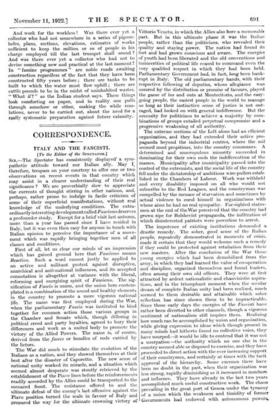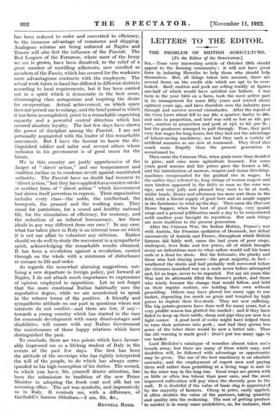CORRESPONDENCE.
ITALY AND THE FASCISTI.
[To the Editor of the SPECTATOR.] SIR,--The Spectator has consistently displayed' a sym- pathetic attitude toward our Italian ally. May I, therefore, trespass on your courtesy to offer one or two observations on recent events in that country which may assist in a clearer understanding of their real significance ? We are proverbially slow to appreciate the currents of thought stirring in other nations, and, perhaps, rather prone to indulge in facile criticism of some of their superficial manifestations, without real knowledge of the underlying conditions. The extra- ordinarily interesting development called Fascismo deserves a profounder study. Except for a brief visit last autumn, more than a year has passed since I have resided in Italy, but it was even then easy for anyone in touch with Italian opinion to perceive the importance of a move- ment which was rapidly bringing together men of all classes and conditions.
First of all, let us clear our minds of an impression which has gained ground here that Fascismo means Reaction. Such a word cannot justly be applied to an active and militant protest against disruptive, anarchical and anti-national influences, and its accepted connotation is altogether at variance with the liberal, reforming and energizing spirit of Fascismo. The sig- nification of Fascio is union, and the union here contem- plated is a combination of the sound and healthy elements in the country to promote a more vigorous national life. The name was first employed during the War, when the parliamentary Fascio was instituted to bind together for common action those various groups in the Chamber and Senate which, though differing in political creed and party loyalties, agreed to bury their differences and work as a united body to promote the victory of the Allied Powers. The name is, of course, derived from the fasces or bundles of rods carried by the lictors.
The War did much to stimulate the evolution of the Italians as a nation, and they showed themselves at their best after the disaster of Caporetto. The new sense of national unity worked its miracle, and a situation which seemed almost desperate was stoutly retrieved by the establishment of the Piave lines before the reinforcements readily accorded by the Allies could be transported to the menaced front. The resistance offered to and the ultimate defeat of the enemy's last offensive against the Piave position turned the scale in favour of Italy and Prepared the way for the ultimate crowning victory of Vittorio Veneto, in which the Allies also bore a memorable part. But in this ultimate phase it was the Italian people, rather than the politicians, who revealed their quality and staying power. The nation had found its feet and had grown conscious and aware. The energies of youth had been liberated and the old conventions and insincerities of political life ceased to command even the very qualified respect in which they had been held. Parliamentary Government had, in fact, long been bank- rupt in Italy. The old parliamentary hands, with their respective following of deputies, whose allegiance was assured by the distribution or promise of favours, played the game of ins and outs at Montecitorio, and the easy- going people, the easiest people in the world to manage so long as their instinctive sense of justice is not out- raged, had looked on with general indifference. But the necessity for politicians to achieve a majority by com- binations of groups entailed perpetual compromise and a progressive weakening of all authority.
The extreme sections of the Left alone had an efficient organization, and they had extended their active pro- paganda beyond the industrial centres, where the soil seemed most propitious, into the country communes. A determined and unscrupulous minority succeeded in dominating for their own ends the indifferentism of the masses. Municipality after municipality passed into the control of the extremists, and the social life of the country fell under the dictatorship of ambitious wire-pullers estab- lished in the Chambers of Labour. Work was withheld and every disability imposed on all who would not subscribe to the Red Leagues, and the countryman was compelled by the menace of starvation and sometimes by actual violence to enrol himself in organizations with whose aims he had no real sympathy. Far-sighted states- men at the end of the War perceived that the country had grown ripe for Bolshevist propaganda, the infiltration of which disinterested patriots were powerless to arrest.
The impotence of existing institutions demanded a drastic remedy. The sober, good sense of the Italian people, repeatedly demonstrated in moments of crisis, made it certain that they would welcome such a remedy if they could be protected against retaliation from their new masters. After the conclusion of the War those young energies which had been demobilized from the army, in which they had learned the value of co-operation and discipline, organized themselves and found leaders, often among their own old officers. They were at first attracted by ardent nationalistic and chauvinistic aspira- tions, and in the triumphant moment when the secular dream of complete Italian unity had been realized, much seemed to them desirable and attainable which sober reflection has since shown them to be impracticable. Since those early days the energies of the Fascisti have rather been diverted to other channels, though a vigorous sentiment of nationalism still inspires them. Realizing how much can be accomplished by union and organization, while giving expression to ideas which though present in many minds had hitherto found no collective voice, they have usurped—it would be idle to contend that it was not a usurpation—the authority which no one else in the country seemed able or disposed to exercise, and they have proceeded to direct action with the ever increasing support of their countrymen, and certainly at times with the tacit approval of the hierarchy. Some excesses there have been no doubt in the past, when their organization was less strong, rapidly diminishing as it increased in numbers and influence. They have already in the last two years accomplished much useful constructive work. The chaos prevailing in the great port of Genoa under the tyranny of a union which the weakness and timidity of former Governments had endowed with autonomous powers, has been reduced to order and converted to efficiency, to the immense advantage of commerce and shipping. Analogous reforms are being enforced at Naples and Trieste will also feel the influence of the Fascisti: The Red Leagues of the Ferrarese, where most of the hemp we use is grown, have been dissolved, to the relief of a great number of unwilling adherents, now enrolled as members of the Fascio, which has secured for the workmen more advantageous contracts with the employers. The actual work taken in hand has differed in different districts according to local requirements, but it has been carried out in a spirit which is democratic in the best sense, discouraging class antagonism and inspiring the desire for co-operation. Actual achievement, on which space does not permit me to enlarge, and the brief period in which it has been accomplished, point to a remarkable organizing capacity and a powerful central direction which has secured absolute loyalty. The last few days have shown the power of discipline among the Fascisti. I am not personally acquainted with the leader of this remarkable movement. But I have the honour to know the dis- tinguished soldier and sailor and several others whose inclusion in his government is of good omen for the future.
We in this country are justly apprehensive of the danger of " direct action," and our temperament and tradition incline us to condemn revolt against constituted authority. The Fascisti have no doubt had recourse to "direct action," but they have applied it as a counter-stroke to another form of " direct action " which Government had shown itself powerless to repress. Their organization includes every class—the noble, the intellectual, the bourgeois, the peasant and the working man. They stand for patriotism, for a sound and healthy national life, for the stimulation of efficiency, for economy, and the reduction of an inflated bureaucracy. Are these ideals in any way different from our own ? In any case, what has taken place in Italy is an internal issue on which it is not our affair to volunteer any criticism. Rather should we do well to study the movement in a sympathetic spirit, acknowledging the remarkable results obtained. It has been a revolution against a revolution, carried through on the whole with a minimum of disturbance or menace to life and order.
As regards the somewhat alarming suggestions, out- lining a new departure in foreign policy, put forward at Naples, I do not attach much importance to expressions of opinion employed in opposition. Let us not forget that the more emotional Italian habitually uses the superlative degree, while we are accustomed to speak in the soberer terms of the positive. A friendly and sympathetic attitude on our part in questions where our interests do not conflict—and there are few, if any— towards a young country which has started in the race for economic development with many disadvantages and disabilities, will ensure with any Italian Government the maintenance of those happy relations which have distinguished the past.
To conclude, there are two points which have favour- ably impressed me as a lifelong student of Italy in the events of the past few days. The first has been the attitude of the sovereign who has rightly interpreted the will of the people, to do which has always corre- sponded to his high conception of his duties. The second, to which you have, Sir, yourself drawn attention, has been the submission to tradition of the new Prime Minister in adopting the frock coat and silk hat on assuming office. The act was symbolic, and impressively so in Italy. It reminds me, with a difference, of Garibaldi's famous Obbedisco.—I am, Sir, &c.,
RENNELL RODD.



























































 Previous page
Previous page